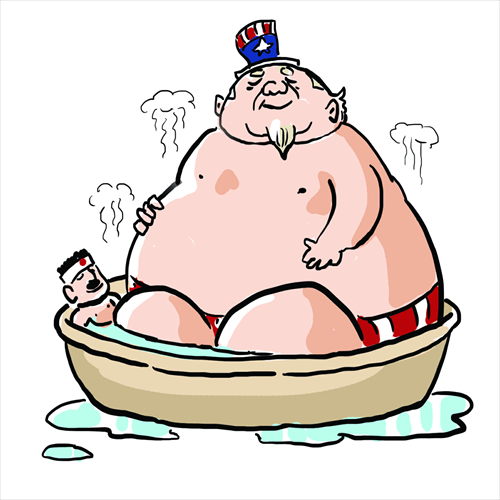HOME >> OP-ED
Washington-Tokyo alliance outdated and risky
Source:Global Times Published: 2014-2-26 19:53:01

Illustration: Liu Rui/GT
Earlier this month, US Secretary of State John Kerry stressed the US commitment to defend Japan if it is attacked. It is disappointing that Kerry made such a statement which only contributed to tensions.China-Japan relations are at their lowest point since the end of WWII. The US-Japan alliance is a root cause of conflict.
China's claim over the Diaoyu Islands is legitimate, and Japan's position is unjustifiable. If not for the US-Japan alliance, Japan would be more prepared to recognize China's claim and negotiate in good faith.
Now it's actually a confrontation not between Japan and China, but between the Japan-US alliance and China.
The US was previously more neutral, but Washington's policy has moved more toward supporting Japan and the status quo.
The Obama administration's "pivot to the Asia-Pacific" is a grave mistake. US and US-allied power in East Asia is already excessive, imbalanced and in favor of Washington.
The US still widely dominates the region in terms of military power because of the bases in Japan and South Korea, so what's the point of a pivot?
The excessive power located close to China is a potential, if not already actual, threat to China. The "pivot" will exacerbate the extent of the imbalance in favor of the US, and create a bigger arms race.
China will not be intimidated into slowing its defense buildup and, understandably and legitimately, will not accept the status quo.
When US Vice President Joe Biden went to Japan before he visited Beijing in December, he said the US-Japan alliance is the "cornerstone" of US security. The other thing that Biden said, which is correct, is that the US-China relationship is going to be "central, sort of the organizing principle" in international relations in this century.
However, there is a deep contradiction between "the organizing principle" and the US-Japan alliance system.
Japan naturally likes the alliance system. They don't mind and rather desire that the US have bases there and are committed in some way to defend Japan.
The point is the alliance is no longer in the fundamental US interests, but only in the bureaucratic interest of the Pentagon.
China has legitimate security interests, but China doesn't threaten the US in any way. A fundamental reality that should be more widely acknowledged is that there is no conflict in vital national interests between the US and China.
However, the US does not seem prepared to accept the "new type of great power relations" proposed by Chinese President Xi Jinping at Sunnylands summit in June 2013.
For a constructive relationship, the legacy of the alliance system in East Asia should be ended, and US bases should be withdrawn. That will create the condition for a win-win, stable, mutually beneficial, and constructive relationship between US and China, and for stability for Asia as a whole.
The US is a Pacific nation, not an Asian nation. China should have an equal bilateral relationship with the US. And Japan should sit in the middle as a neutral party, certainly not part of an alliance.
As former Australian defense official Hugh White suggests in his book The China Choice, the US should share power on an equal basis with China as part of a "Concert of Asia." The book also suggests that Japan should become independent. Even though it is hard for the US to withdraw and share power, the biggest difficulty would be in Japan, because they will resist taking care of themselves.
It's alarming and disappointing that bureaucratic interests in Washington seem to be suppressing, not allowing new thinking.
The US must become more rational and realistic about what is really the interests of the US in this region, not just the status quo.
The article was compiled by Global Times reporter Sun Wei based on an interview with Stephen Harner, president at Yangtze Century Ltd and author of the "Whither Japan" blog at Forbes.com, at the LSE 2014 China Development Forum. opinion@globaltimes.com.cn
Posted in: Viewpoint